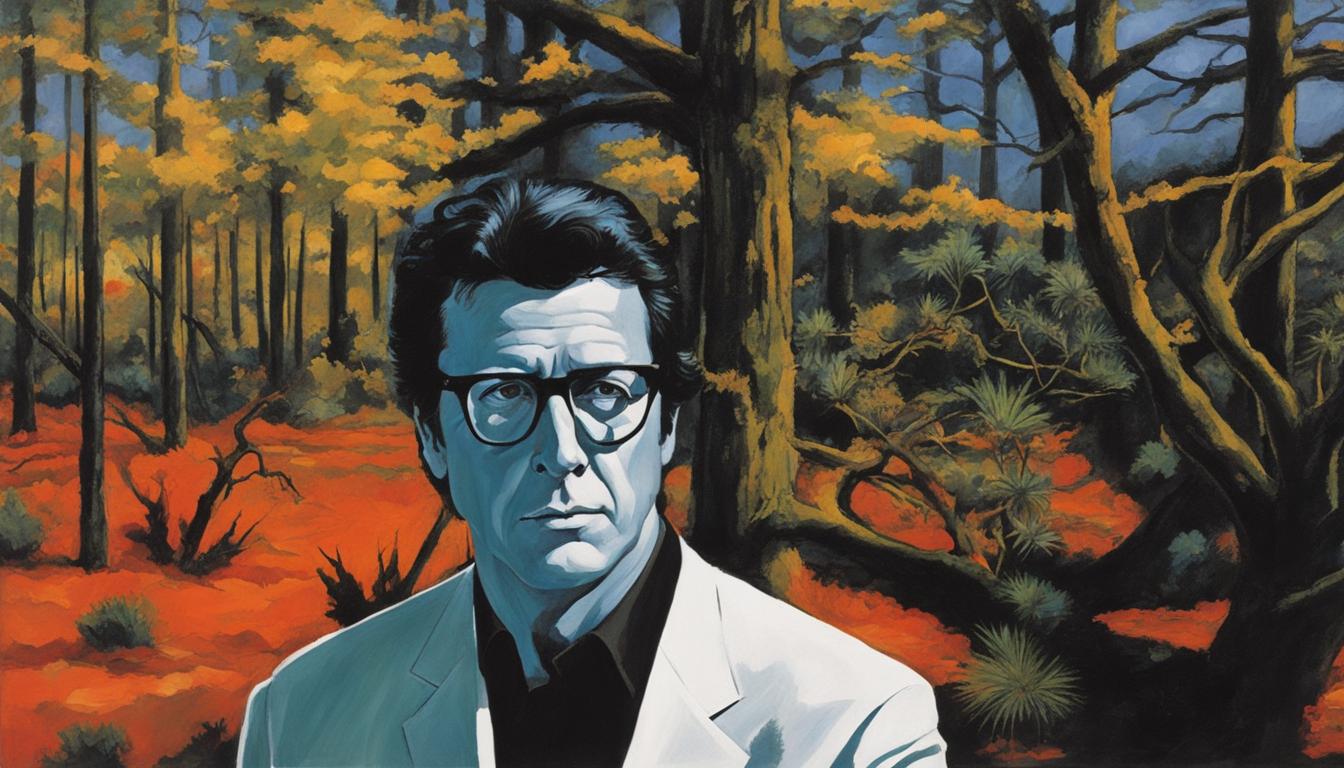In the audiobook version of “State of Fear,” acclaimed author Michael Crichton presents a thrilling narrative that combines science and suspense. Crichton, known for his meticulous research and attention to detail, delivers a captivating story that explores themes such as environmentalism, fear, and manipulation.
Listeners are taken on a journey that challenges their perceptions of the world around them, while also providing an immersive listening experience. This audiobook review will delve into the key aspects of “State of Fear,” including its scientific accuracy, character development, pacing, and more.
Key Takeaways
- “State of Fear” combines science and suspense to create an immersive listening experience.
- Michael Crichton’s attention to detail and research is evident throughout the audiobook.
- The narrative tackles thought-provoking themes such as environmentalism and manipulation.
- The audiobook boasts quality narration and voice acting.
- Listeners are kept on the edge of their seats with unexpected twists and turns.
About the Author, Michael Crichton
Michael Crichton was a renowned author, screenwriter, and filmmaker. Born in Chicago in 1942, he graduated summa cum laude from Harvard College before attending Harvard Medical School. Despite his early ambitions to become a doctor, Crichton’s passion for writing led him to pursue a career in literature and entertainment.
Crichton’s breakthrough novel, “The Andromeda Strain,” was published in 1969 and became an instant bestseller. He went on to write numerous other successful novels, including “Jurassic Park,” “Timeline,” and “Prey.” In addition to writing, Crichton also oversaw the creation of several television shows, including the long-running medical drama “ER.”
Crichton’s writing style was characterized by his extensive use of research and his emphasis on scientific accuracy in his works. He often explored topics such as technology, genetics, and environmentalism, pushing the boundaries of what was possible in science fiction.
Despite his untimely death in 2008, Crichton’s legacy continues to live on through his various works and the impact they have had on popular culture.
Plot Summary of “State of Fear”
“State of Fear” by Michael Crichton is a thrilling novel that follows a group of individuals as they navigate through the complexities of the environmental movement. The book’s main character, Peter Evans, is a lawyer who is tasked with investigating a mysterious death that leads him down a dangerous path of discovery.
The story takes place in various locations around the world, including Scotland, England, Antarctica, and the Pacific Ocean. As the plot unfolds, Evans and his team uncover a sinister plot that involves a wealthy environmental group seeking to manipulate public opinion about climate change.
The central conflict in “State of Fear” centers around the environmentalists’ manipulation of scientific data to support their beliefs, while disregarding evidence that contradicts their claims. Crichton masterfully incorporates real-world facts and research to add an extra layer of authenticity to the storyline.
One of the key themes of the book is the idea that fear can be used as a tool to manipulate people and gain power. Crichton weaves in elements of suspense and thriller throughout the narrative, keeping readers on the edge of their seats with unexpected twists and turns.
The plot summary of “State of Fear” serves as an excellent introduction to the overall narrative and themes of Michael Crichton’s audiobook. The story is not only entertaining but also thought-provoking, making it a must-read for anyone interested in environmentalism, science, and humanity’s impact on the planet.
Narration and Voice Acting
The narration and voice acting in the audiobook version of “State of Fear” brings the story to life in an impressive way. The narrator’s voice is clear, easy to understand, and engaging for the listener. This makes it easy to follow along with the plot and stay invested in the story from start to finish.
The voice actor’s ability to convey emotion and inflection through their tone of voice enhances the listening experience. From intense action scenes to emotional dialogue, the voice actor does an excellent job at keeping the listener engaged and on the edge of their seat.
The use of multiple voices and sound effects further adds to the immersive experience of the audiobook, making the listener feel like they are a part of the story. The overall quality of the narration and voice acting only reinforces the already captivating nature of “State of Fear”.

Scientific Accuracy and Research
“State of Fear” by Michael Crichton stands out for its meticulous attention to scientific accuracy and incorporation of real-world research.
Crichton, who had a background in medicine, was known for his dedication to researching scientific concepts for his works of fiction. “State of Fear” is no exception, as it incorporates a range of scientific topics, including geology, climatology, and ecology.
The book even includes a list of references and recommended reading for those interested in further exploring the scientific concepts discussed in the narrative, showcasing the author’s commitment to scientific accuracy and research.
Through this dedication to scientific accuracy, “State of Fear” presents a thought-provoking exploration of the intersection of science and society, making it a must-read for anyone interested in the impact of scientific research on the world around us.
Themes and Social Commentary
In “State of Fear,” Michael Crichton explores various themes and offers insightful social commentary. One theme that stands out is environmentalism. Through the narrative, Crichton examines how environmentalists use fear tactics to push their agenda, ultimately causing more harm than good. He also touches on the manipulation of data and facts to further personal agendas.
Another theme explored in the audiobook is fear. Crichton delves into the power of fear, and how it can be used to control people’s beliefs and actions. Additionally, he critiques the media’s role in perpetuating fear and creating hysteria among the public.
Finally, “State of Fear” offers commentary on the manipulation of public opinion. Crichton uses the narrative to highlight how small groups with strong agendas can use their resources and influence to sway public opinion and policy.
The themes and social commentary present in “State of Fear” make for a thought-provoking and captivating listening experience, leaving the listener with much to ponder beyond the narrative itself.
Engaging Storytelling and Pacing
Michael Crichton’s State of Fear showcases masterful storytelling skills through a captivating, suspenseful narrative. The author’s unique style of blending science with thrilling storytelling creates an immersive experience for the listener.
The book’s pacing is expertly crafted, ensuring that the listener is never bored. The balance between plot development and action scenes keeps the listener engaged, and the occasional break in the action provides a welcome opportunity for reflection.
Crichton’s writing style creates an intense and immersive experience that keeps the listener hooked from beginning to end. The audiobook’s pacing helps to build tension and suspense, culminating in a thrilling climax that will leave listeners on the edge of their seats.
Character Development
Michael Crichton has long been praised for his ability to create well-developed characters, and “State of Fear” is no exception. Throughout the narrative, he masterfully crafts individuals that are multi-dimensional, realistic, and memorable.
One of the most significant examples of character development in “State of Fear” is the arc of the main protagonist, Peter Evans. At the beginning of the story, he is portrayed as a button-down lawyer who is focused solely on his work. However, as he becomes more involved in the central conflict, he begins to question his values and the world around him. The evolution of his character is both engaging and believable, adding depth and nuance to the story.
Another character that undergoes notable development is Sarah Jones, Peter’s love interest. Initially, she is somewhat one-dimensional, portrayed solely as an environmental activist. However, as the story progresses, she reveals more layers to her personality, including moments of vulnerability and doubt. This allows the reader to connect with her on a deeper level, and adds further complexity to the narrative.
The supporting cast of characters are similarly well-crafted, with each possessing unique motivations, personalities, and backstories. Their interactions with each other are realistic and nuanced, resulting in a fully realized world that feels both exciting and authentic.
Characters in “State of Fear”
| Name | Description | Development |
|---|---|---|
| Peter Evans | The main protagonist, a lawyer | Undergoes significant emotional growth throughout the story, questioning his values and beliefs. |
| Sarah Jones | Peter’s love interest, an environmental activist | Begins as an idealistic activist but develops more complexity, displaying vulnerability and doubt. |
| John Kenner | An environmentalist with a controversial plan to combat climate change | Reveals layers of complexity and motivation throughout the story, showcasing his inner turmoil and dedication. |
| Theo Detweiler | A venture capitalist and funder of Kenner’s plan | Initially portrayed as ruthless and greedy, but later shows a more sympathetic side. |
Suspense and Thrills
Michael Crichton’s “State of Fear” is a thrilling, action-packed audiobook that will keep listeners on the edge of their seats. The author masterfully creates suspense and tension throughout the narrative, weaving unexpected twists and turns that will leave listeners guessing until the very end.
One of the key elements that contribute to the suspenseful atmosphere is the unpredictable nature of the characters. Just when listeners believe they have a handle on their personalities and motivations, Crichton throws a curveball, subverting expectations and heightening the overall sense of unease.
Furthermore, the audiobook’s fast-paced storytelling and engaging plot ensure that listeners are never left bored, with each chapter building upon the last to create a constantly evolving narrative. From high-speed boat chases to heart-pumping escape scenes, “State of Fear” is a rollercoaster ride of thrills and excitement.
To further enhance the listening experience, the narration and voice acting are top-notch, with expertly delivered characterizations and an overall production value that matches the intensity of the story.
Criticisms and Controversies
Despite its overall success, “State of Fear” has not been without its criticisms and controversies. One major point of contention is the book’s portrayal of environmentalism and climate change, which some readers have described as misleading and misinformed. Others have criticized the book’s characterization of indigenous people and its use of racial stereotypes.
Additionally, the book has faced backlash for its inclusion of graphs and charts that some experts argue are presented in a misleading or manipulative way, to support the book’s arguments rather than accurately depict the data.
Despite these criticisms, “State of Fear” remains a thought-provoking and engaging audiobook that encourages listeners to question the narratives presented to them.
Comparison to Other Michael Crichton Works
In terms of style and thematic elements, “State of Fear” is reminiscent of several other notable works by Michael Crichton.
| “State of Fear” | “Jurassic Park” | “The Andromeda Strain” | |
|---|---|---|---|
| Publication Year | 2004 | 1990 | 1969 |
| Main Theme | Environmentalism and Fear | Genetic Engineering and Chaos Theory | Extraterrestrial Microbes and Scientific Experimentation |
| Central Conflict | A group’s struggle to prove and prevent a looming environmental crisis | A group’s struggle to survive in a park full of genetically re-created dinosaurs | A group’s attempt to contain a deadly extraterrestrial microbe at a secret underground facility |
| Main Character | Peter Evans | Dr. Alan Grant | Dr. Jeremy Stone |
| Setting | Various global locations | Isla Nublar, Costa Rica | Piedmont, Arizona |
Despite the differences in plot, setting, and main characters, these works share important similarities. Crichton’s penchant for meticulous scientific research and attention to detail is present in all three works. Additionally, each work highlights the dangers of humanity’s attempt to manipulate or control the natural world.
However, some readers may find that “State of Fear” lacks the visceral thrills and action-driven plot of “Jurassic Park” or the groundbreaking scientific concepts of “The Andromeda Strain.” Instead, “State of Fear” is a more intellectually stimulating work that explores complex themes and social issues.
Conclusion
In conclusion, “State of Fear” by Michael Crichton proves to be an enthralling audiobook, gripping listeners with its suspenseful storyline, captivating characters, and scientific intrigue. The expert narration and voice acting enhance the listening experience, immersing the audience in the story. Crichton’s meticulous attention to scientific accuracy and research is commendable and adds credibility to the narrative, while the exploration of themes such as environmentalism, fear, and manipulation provide thought-provoking social commentary. The pacing and storytelling techniques keep listeners engaged throughout, while unexpected twists and turns provide thrilling suspense. Although there may be some criticisms or controversies surrounding the portrayal of certain topics, “State of Fear” remains a powerful and effective audiobook that is sure to appeal to listeners who enjoy a well-crafted and thought-provoking story.



